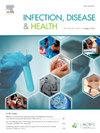Moral distress among infection prevention and control professionals: A scoping review
IF 2
Q2 PUBLIC, ENVIRONMENTAL & OCCUPATIONAL HEALTH
引用次数: 0
Abstract
Background
The COVID-19 pandemic highlighted the vital role of Infection Prevention and Control Professionals (IPCPs) in safeguarding public health. Amid rapidly evolving guidelines, critical personal protective equipment shortages, and surging workloads, IPCPs encountered unprecedented moral and ethical dilemmas. However, their experiences, ethical challenges, and the resulting moral distress remain understudied.
Methods
A scoping review following Arksey and O’Malley’s methodology was conducted to examine current research on ethical challenges and moral distress among IPCPs. Searches in CINAHL, MEDLINE via OVID, Emcare, Scopus, and Korea Citation Index yielded two extracted articles.
Results
Common themes included high workload, increased recognition, pressure to deliver accurate and timely information, need for peer support, and evidence-based practice. Differences in nationality, role discretion, and administrative systems led to varied experiences. District Medical Officers in Norway experienced more decision-making responsibilities and resulting ethical dilemmas in the context of broader communities and municipalities. The experiences of IPCPs were confined to their respective healthcare facilities.
Conclusion
There is a dearth of available research reporting the moral distress experienced by IPCPs whilst there is a plethora for those seen as “frontline” workers. Given the integral decision-making and implementation roles of these health professionals, and the burdens of ethical dilemmas they experienced in pandemic preparedness and response, further research is imperative to inform strategies to build moral resilience in the future.
感染预防与控制专业人员的精神压力:范围审查。
背景:COVID-19 大流行凸显了感染预防与控制专业人员 (IPCP) 在保障公共卫生方面的重要作用。在指导方针迅速演变、个人防护设备严重短缺和工作量激增的情况下,IPCPs 遇到了前所未有的道德和伦理困境。然而,他们的经历、伦理挑战以及由此产生的道德困扰仍未得到充分研究:方法:我们按照 Arksey 和 O'Malley 的方法进行了一次范围界定研究,以考察当前有关 IPCPs 所面临的伦理挑战和道德困扰的研究。在 CINAHL、MEDLINE via OVID、Emcare、Scopus 和韩国引文索引中进行了检索,共摘录了两篇文章:共同的主题包括工作量大、认可度提高、提供准确及时信息的压力、需要同行支持以及循证实践。国籍、角色自由裁量权和行政制度的不同导致了不同的经验。挪威的地区医务官员在更广泛的社区和市政范围内承担了更多的决策责任,并因此遇到了道德难题。IPP的经验则局限于各自的医疗机构:有关 IPCPs 所经历的道德困境的研究报告很少,而有关被视为 "一线 "工作者的研究报告却很多。鉴于这些卫生专业人员在决策和执行方面的重要作用,以及他们在大流行病防备和应对过程中所经历的道德困境的负担,进一步的研究势在必行,以便为未来建立道德复原力的战略提供信息。
本文章由计算机程序翻译,如有差异,请以英文原文为准。
求助全文
约1分钟内获得全文
求助全文
来源期刊

Infection Disease & Health
PUBLIC, ENVIRONMENTAL & OCCUPATIONAL HEALTH-
CiteScore
5.70
自引率
5.70%
发文量
40
审稿时长
20 days
期刊介绍:
The journal aims to be a platform for the publication and dissemination of knowledge in the area of infection and disease causing infection in humans. The journal is quarterly and publishes research, reviews, concise communications, commentary and other articles concerned with infection and disease affecting the health of an individual, organisation or population. The original and important articles in the journal investigate, report or discuss infection prevention and control; clinical, social, epidemiological or public health aspects of infectious disease; policy and planning for the control of infections; zoonoses; and vaccination related to disease in human health. Infection, Disease & Health provides a platform for the publication and dissemination of original knowledge at the nexus of the areas infection, Disease and health in a One Health context. One Health recognizes that the health of people is connected to the health of animals and the environment. One Health encourages and advances the collaborative efforts of multiple disciplines-working locally, nationally, and globally-to achieve the best health for people, animals, and our environment. This approach is fundamental because 6 out of every 10 infectious diseases in humans are zoonotic, or spread from animals. We would be expected to report or discuss infection prevention and control; clinical, social, epidemiological or public health aspects of infectious disease; policy and planning for the control of infections; zoonosis; and vaccination related to disease in human health. The Journal seeks to bring together knowledge from all specialties involved in infection research and clinical practice, and present the best work in this ever-changing field. The audience of the journal includes researchers, clinicians, health workers and public policy professionals concerned with infection, disease and health.
 求助内容:
求助内容: 应助结果提醒方式:
应助结果提醒方式:


